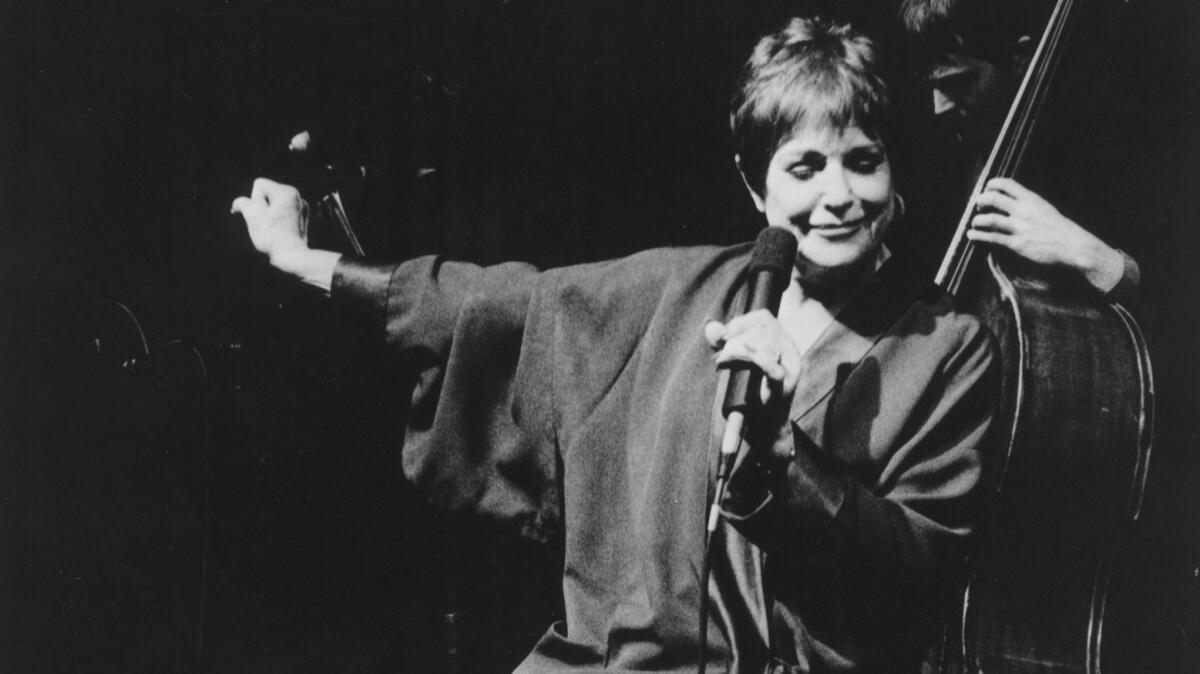Annie Ross, jazz singer and actress who overcame demons, dies

For a few remarkable years in the late 1950s and early 1960s, Annie Ross was the epitome of hip as part of a chart-topping vocal trio that made her an international jazz star.
She was the octave-leaping third member of the popular ensemble Lambert, Hendricks & Ross, known for her rapid-fire, improvised scat and witty lyricism. In five years, they recorded six albums, establishing the jazz style known as vocalese and touring the world as one of the first racially integrated singing groups in popular music.
“Annie Ross has that feeling you can’t learn in no school, that feeling that the men in the old Basie band had from birth,” her former partner, the late Jon Hendricks, once said.
But Ross flew a little too high, and for many years, she struggled with drug addiction, bankruptcy and unemployment. She reemerged in the 1980s and 1990s as an actress, appearing in “Superman III,” “Throw Momma From the Train” and Robert Altman’s films “The Player” and the Oscar-nominated “Short Cuts.”
Ross, who continued to perform through her 80s, died Tuesday at her home in Manhattan, her former manager, Jim Coleman, told the New York Times. She was 89.
Ross was born Annabelle McCauley Allan Short in Surrey, England, on July 25, 1930, into a well-known Scottish vaudeville family. She first appeared on stage at age 3 and became known as the “Scottish Shirley Temple.”
Ross sailed to New York when she was 4 with her parents on vacation. While there, she won a radio show contest and earned a six-month contract with MGM. Her parents were convinced of Ross’ star quality and sent her to find fame in Los Angeles with her mother’s sister, Scottish American singer Ella Logan. She didn’t see her parents again for 14 years.
As Annabelle Logan, Ross landed a role in “Our Gang Follies of 1938” and at 11, she played Judy Garland’s sister in the 1943 film “Presenting Lily Mars.” But her real passion was singing.
At 14, she won a contest held by Hawthorne School by singing her own song, “Let’s Fly,” which Johnny Mercer went on to record. At 17, she left high school, changed her name to Annie Ross and went home to Scotland. While in Europe, she worked as a revue performer and a band singer.
At 19, Ross had an affair with the jazz drummer Kenny Clarke and gave birth to a son, Kenny Clarke Jr. She returned to the U.S. with her baby, but decided she couldn’t raise him alone and work late nights and she sent him to live with his uncle in Pittsburgh.
In 1952, after two tough years scrounging for work, Prestige Records producer Bob Weinstock asked her to write lyrics to a jazz solo. Ross came back the next day with a treatment of tenor saxophonist Wardell Gray’s 1949 composition titled “Twisted.” She turned the instrumental into a tale of split personalities.
Unconvinced the song would amount to anything, Ross returned to her family’s vaudeville act in Scotland. While she was gone “Twisted” became an underground hit.
“Someone sent me a clipping saying that I’d won the Down Beat New Star Award,” she told the New York Times in 1993. “So I came back. It got me a few more gigs.”
She spent the next five years working in jazz clubs and theater, performing alongside Count Basie, Charlie Parker and Dizzy Gillespie. She also became close friends with Billie Holliday. Along the way, she had an affair with Lenny Bruce.
In 1958, Ross was hired to join Hendricks and bebop singer and arranger Dave Lambert. They recorded “Sing a Song of Basie,” featuring lyrics over Basie songs, and the trio stayed at the top of the jazz polls for four years. But during that time, Ross’ drug habit consumed her.
After a near-fatal heroin overdose, she stayed in London in May 1962 to get sober. In 1963, she married actor Sean Lynch and they opened the short-lived nightclub Annie’s Room in London, featuring Nina Simone, Anita O’Day, Erroll Garner and others.
But by the late 1960s she was struggling again. She appeared in small TV and film roles and on stage at the Royal Opera House in “The Threepenny Opera” in 1972 and in the “The Seven Deadly Sins” in 1973. In 1975, she and Lynch divorced and Ross declared bankruptcy, losing her house. Lynch later died in a car crash.
In 1979, Ross earned a small role performing with Richard Gere in the film “Yanks.” In the mid-1980s, director Robert Altman became enamored of Ross after his wife befriended the singer. He cast her in the 1992 comedy “The Player” and then again as a ravaged jazz singer opposite Lori Singer in his 1993 Oscar nominated ensemble drama “Short Cuts.”
Ross and Hendricks reunited in the late 1990s and performed together off and on until his death in 2017. She was inducted into the ASCAP Jazz Wall of Fame in 2009. In 2012, Ross was the subject of a documentary, “Annie Ross: No One but Me.”
Piccalo is a former Times staff writer.
More to Read
Start your day right
Sign up for Essential California for the L.A. Times biggest news, features and recommendations in your inbox six days a week.
You may occasionally receive promotional content from the Los Angeles Times.






